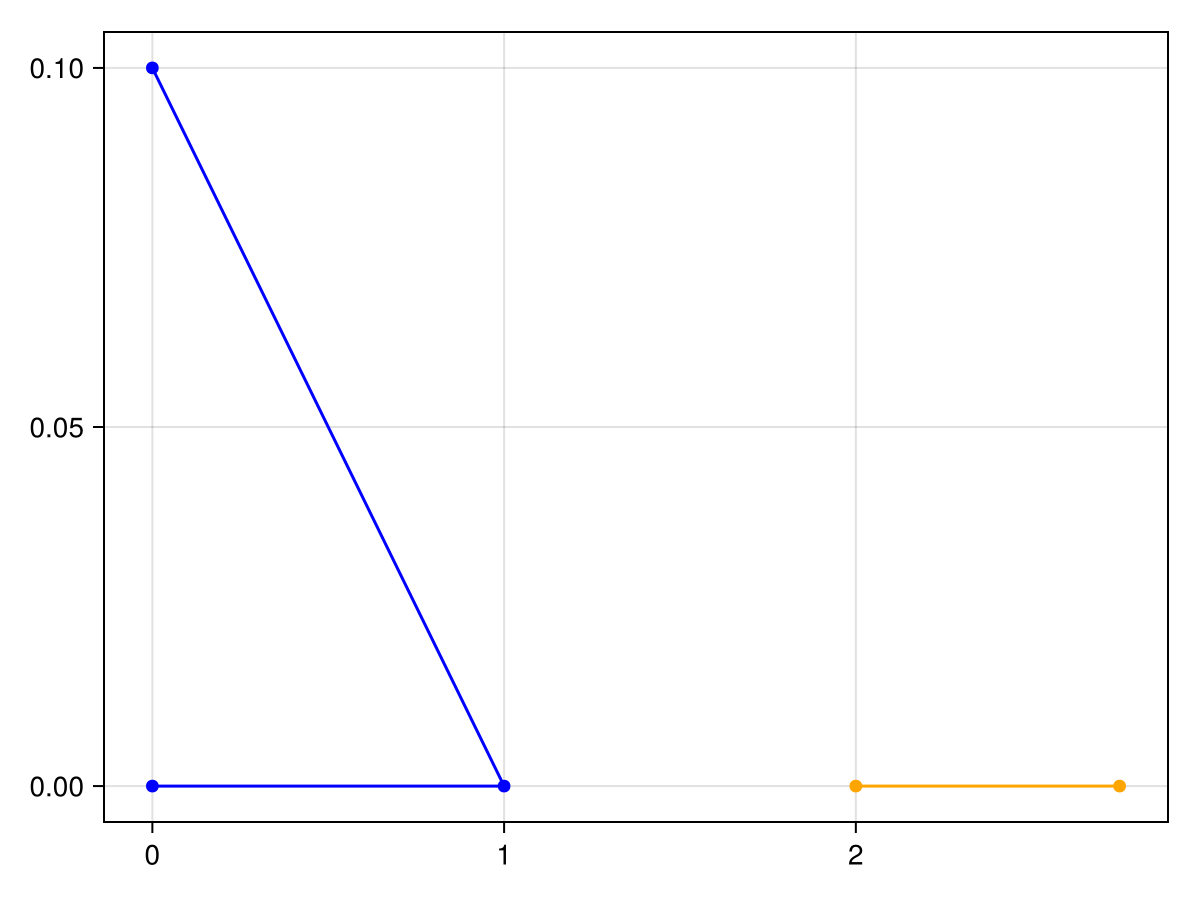Disjoint
export disjointWhat is disjoint?
The disjoint function checks if one geometry is outside of another geometry, without sharing any boundaries or interiors.
To provide an example, consider these two lines:
import GeometryOps as GO
import GeoInterface as GI
using Makie
using CairoMakie
l1 = GI.LineString([(0.0, 0.0), (1.0, 0.0), (0.0, 0.1)])
l2 = GI.LineString([(2.0, 0.0), (2.75, 0.0)])
f, a, p = lines(GI.getpoint(l1), color = :blue)
scatter!(GI.getpoint(l1), color = :blue)
lines!(GI.getpoint(l2), color = :orange)
scatter!(GI.getpoint(l2), color = :orange)
f
We can see that none of the edges or vertices of l1 interact with l2 so they are disjoint.
GO.disjoint(l1, l2) # returns truetrueImplementation
This is the GeoInterface-compatible implementation.
First, we implement a wrapper method that dispatches to the correct implementation based on the geometry trait.
Each of these calls a method in the geom_geom_processors file. The methods in this file determine if the given geometries meet a set of criteria. For the disjoint function and arguments g1 and g2, this criteria is as follows: - points of g1 are not allowed to be in the interior of g2 - points of g1 are not allowed to be on the boundary of g2 - points of g1 are allowed to be in the exterior of g2 - no points required to be in the interior of g2 - no points of g1 are required to be on the boundary of g2 - no points of g1 are required to be in the exterior of g2
The code for the specific implementations is in the geom_geom_processors file.
const DISJOINT_ALLOWS = (in_allow = false, on_allow = false, out_allow = true)
const DISJOINT_CURVE_ALLOWS = (over_allow = false, cross_allow = false, on_allow = false, out_allow = true)
const DISJOINT_REQUIRES = (in_require = false, on_require = false, out_require = false)
const DISJOINT_EXACT = (exact = False(),)
"""
disjoint(geom1, geom2)::Bool
Return `true` if the first geometry is disjoint from the second geometry.
Return `true` if the first geometry is disjoint from the second geometry. The
interiors and boundaries of both geometries must not intersect.
# Examples
```jldoctest setup=:(using GeometryOps, GeoInterface)
import GeometryOps as GO, GeoInterface as GI
line = GI.LineString([(1, 1), (1, 2), (1, 3), (1, 4)])
point = (2, 2)
GO.disjoint(point, line)output
true
```
"""
disjoint(g1, g2) = _disjoint(trait(g1), g1, trait(g2), g2)
"""
disjoint(g1)
Return a function that checks if its input is disjoint from `g1`.
This is equivalent to `x -> disjoint(x, g1)`.
"""
disjoint(g1) = Base.Fix2(disjoint, g1)Point disjoint geometries
Point is disjoint from another point if the points are not equal.
_disjoint(
::GI.PointTrait, g1,
::GI.PointTrait, g2,
) = !equals(g1, g2)Point is disjoint from a linestring if it is not on the line's edges/vertices.
_disjoint(
::GI.PointTrait, g1,
::Union{GI.LineTrait, GI.LineStringTrait}, g2,
) = _point_curve_process(
g1, g2;
DISJOINT_ALLOWS...,
closed_curve = false,
)Point is disjoint from a linearring if it is not on the ring's edges/vertices.
_disjoint(
::GI.PointTrait, g1,
::GI.LinearRingTrait, g2,
) = _point_curve_process(
g1, g2;
DISJOINT_ALLOWS...,
closed_curve = true,
)
#= Point is disjoint from a polygon if it is not on any edges, vertices, or
within the polygon's interior. =#
_disjoint(
::GI.PointTrait, g1,
::GI.PolygonTrait, g2,
) = _point_polygon_process(
g1, g2;
DISJOINT_ALLOWS...,
DISJOINT_EXACT...,
)
#= Geometry is disjoint from a point if the point is not in the interior or on
the boundary of the geometry. =#
_disjoint(
trait1::Union{GI.AbstractCurveTrait, GI.PolygonTrait}, g1,
trait2::GI.PointTrait, g2,
) = _disjoint(trait2, g2, trait1, g1)Lines disjoint geometries
#= Linestring is disjoint from another line if they do not share any interior
edge/vertex points or boundary points. =#
_disjoint(
::Union{GI.LineTrait, GI.LineStringTrait}, g1,
::Union{GI.LineTrait, GI.LineStringTrait}, g2,
) = _line_curve_process(
g1, g2;
DISJOINT_CURVE_ALLOWS...,
DISJOINT_REQUIRES...,
DISJOINT_EXACT...,
closed_line = false,
closed_curve = false,
)
#= Linestring is disjoint from a linearring if they do not share any interior
edge/vertex points or boundary points. =#
_disjoint(
::Union{GI.LineTrait, GI.LineStringTrait}, g1,
::GI.LinearRingTrait, g2,
) = _line_curve_process(
g1, g2;
DISJOINT_CURVE_ALLOWS...,
DISJOINT_REQUIRES...,
DISJOINT_EXACT...,
closed_line = false,
closed_curve = true,
)
#= Linestring is disjoint from a polygon if the interior and boundary points of
the line are not in the polygon's interior or on the polygon's boundary. =#
_disjoint(
::Union{GI.LineTrait, GI.LineStringTrait}, g1,
::GI.PolygonTrait, g2,
) = _line_polygon_process(
g1, g2;
DISJOINT_ALLOWS...,
DISJOINT_REQUIRES...,
DISJOINT_EXACT...,
closed_line = false,
)
#= Geometry is disjoint from a linestring if the line's interior and boundary
points don't intersect with the geometry's interior and boundary points. =#
_disjoint(
trait1::Union{GI.LinearRingTrait, GI.PolygonTrait}, g1,
trait2::Union{GI.LineTrait, GI.LineStringTrait}, g2,
) = _disjoint(trait2, g2, trait1, g1)Rings disjoint geometries
#= Linearrings is disjoint from another linearring if they do not share any
interior edge/vertex points or boundary points.=#
_disjoint(
::GI.LinearRingTrait, g1,
::GI.LinearRingTrait, g2,
) = _line_curve_process(
g1, g2;
DISJOINT_CURVE_ALLOWS...,
DISJOINT_REQUIRES...,
DISJOINT_EXACT...,
closed_line = true,
closed_curve = true,
)
#= Linearring is disjoint from a polygon if the interior and boundary points of
the ring are not in the polygon's interior or on the polygon's boundary. =#
_disjoint(
::GI.LinearRingTrait, g1,
::GI.PolygonTrait, g2,
) = _line_polygon_process(
g1, g2;
DISJOINT_ALLOWS...,
DISJOINT_REQUIRES...,
DISJOINT_EXACT...,
closed_line = true,
)Polygon disjoint geometries
#= Polygon is disjoint from another polygon if they do not share any edges or
vertices and if their interiors do not intersect, excluding any holes. =#
_disjoint(
::GI.PolygonTrait, g1,
::GI.PolygonTrait, g2,
) = _polygon_polygon_process(
g1, g2;
DISJOINT_ALLOWS...,
DISJOINT_REQUIRES...,
DISJOINT_EXACT...,
)Geometries disjoint multi-geometry/geometry collections
#= Geometry is disjoint from a multi-geometry or a collection if all of the
elements of the collection are disjoint from the geometry. =#
function _disjoint(
::Union{GI.PointTrait, GI.AbstractCurveTrait, GI.PolygonTrait}, g1,
::Union{
GI.MultiPointTrait, GI.AbstractMultiCurveTrait,
GI.MultiPolygonTrait, GI.GeometryCollectionTrait,
}, g2,
)
for sub_g2 in GI.getgeom(g2)
!disjoint(g1, sub_g2) && return false
end
return true
endMulti-geometry/geometry collections coveredby geometries
#= Multi-geometry or a geometry collection is covered by a geometry if all
elements of the collection are covered by the geometry. =#
function _disjoint(
::Union{
GI.MultiPointTrait, GI.AbstractMultiCurveTrait,
GI.MultiPolygonTrait, GI.GeometryCollectionTrait,
}, g1,
::GI.AbstractGeometryTrait, g2,
)
for sub_g1 in GI.getgeom(g1)
!disjoint(sub_g1, g2) && return false
end
return true
endThis page was generated using Literate.jl.